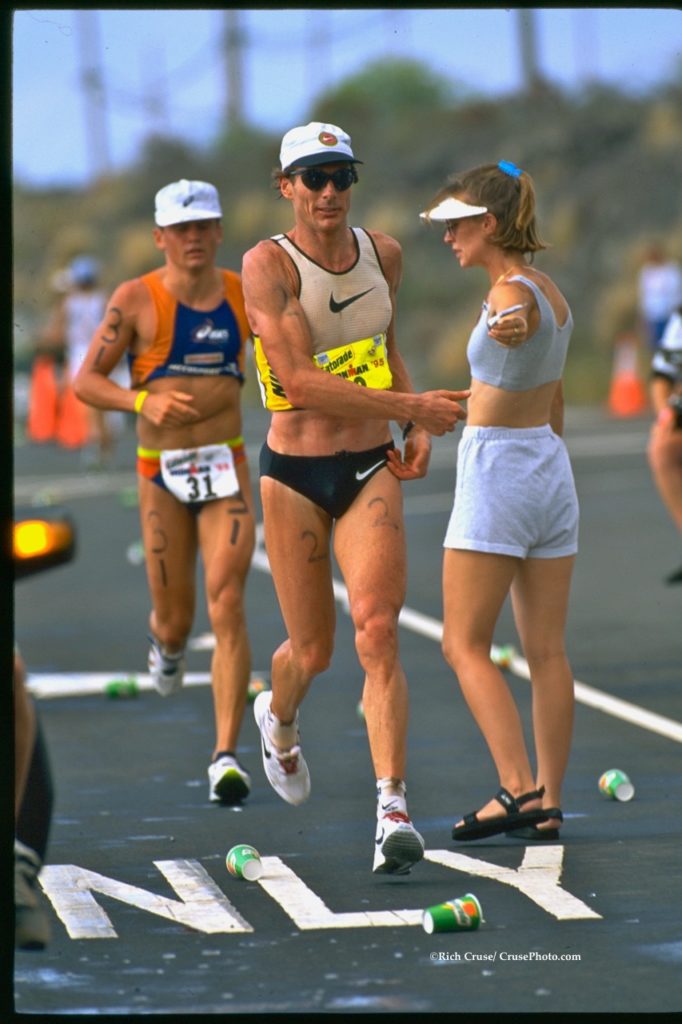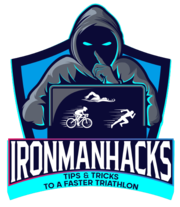“Listen to your body.”
That’s what you hear all the time from people who are just trying to give you good race advice. But they have probably have not pushed through real pain before.
If I just listened to my body, I’d probably never even make it out of bed. And I sure as hell wouldn’t swim, bike, or run. Or if I did, I’d never finish.
Many triathletes, and especially cyclists, revel in the pain. They are proud of their ability to endure ridiculous physical discomforts that would have most people throwing in the towel.
Brands like The Sufferfest (and the infamous Pain Cave images they share) and Love the Pain are two examples that come to mind. And there’s a reason.
It’s not just because it sounds cool.
But it’s because embracing some degree of pain can really push you into new realms of performance. You are far more capable than your brain thinks.
How much pain can you endure? When do you make the conscious decision to slow down or quit? Sure, there is a limit, but you can defy it for much longer that you may think, and when you do, you can achieve greatness.
Tim Noakes, in his 900+ page bible entitled Lore of Running, explains what happens when we experience pain.
His Central Governor Model states that as the brain detects an impending oxygen deficiency to the heart and maybe other organs, the brain’s motor cortex stops recruiting additional muscle.
As a result, you feel fatigue and maybe pain. Note that pain is felt and perceived in the brain only – nowhere else.
Then, as the muscles and heart reduce their work output, the heart gets more oxygen, and it remains protected from oxygen starvation.
But if this is in your brain only, what if you could override it? What if you could deny it, and look beyond it? It’s a mental struggle.
Noakes goes on to describes that mental struggle perfectly on page 625:
During the last 10 to 15km of the marathon, it is necessary for your mind to take control and to drive your ailing, complaining, and increasingly unwilling body toward the finishing line. In fact, these complaints must have their origins in the brain itself, for it is in the brain, not in the muscles, that pain is registered and interpreted. These complaints evoke the responses of the first voice of which World Champion triathlete Mark Allen writes.
And if you haven’t read our interview with Allen, check it out here.

Thanks to Rich Cruse for the photo – CrusePhoto.com
Noakes goes on to explain how Allen had an internal argument between his two voices of good and evil, one taunting him, telling him he could never catch the guy in first place, 14km ahead, who was much younger.
The good voice was insisting he had to give it 100% because that was what he had wanted all along and that’s what everybody expected of him.
Allen described it in his book:
But then I realized, no, I was holding back, just a little bit because…I essentially wanted some billboard to come out of the lava and say: “If you give 100%, you will catch Hellriegel [the competitor in first place] and you will win.”
It was like a safety valve. If I only gave 97%, I could say, “Well, if I don’t catch him, I probably could have done it.” One thing was certain: If I didn’t give it 100%, I definitely wasn’t going to win. And I know that I had to give 100% and that there was no guarantee. It might mean that I catch him, it might meant that he finishes five seconds in front of me, but that’s what I had to do.
Of course Allen went on to pass Hellriegel and win, after which Allen retired. Noakes sums it up by saying,
…the ultimate success of his career rested on his insight that taught him the core question: Was he prepared to give whatever it took to win the Ironman or just what he was prepared to take? Only when he had answered that question could he make the physical and psychological adaptations necessary for his success.
In his final race, he could have succumbed to the will of the central governor, which, in the persona of his evil voice, was tempting him with the sanctity of stopping. Why he chose not to stop remains the greater question and the enduring fascination of sport.
So it’s a war of wills: Your central governor (evil) vs your desire to win or perform (good). And to win it, you need to ignore that pain.

That’s not to say that you need to ignore every pain you feel.
Some pains are acute injuries, or flare-ups of past injuries. Those are pretty obvious.
Like if you twist your ankle, rip your plantar fascia, or have a heart attack. Then yeah, sure, listen to your body.
But if you’ve been training for months or years, you should have a really good idea of what pains, aches, and personal idiosyncrasies your body makes, just as routine. You should pretty much know how hard you can push yourself, for how long.
And then I bet you can still go a lot harder, a lot longer.
So, ignore the pain where you can, and remember, it’s all in your head.
